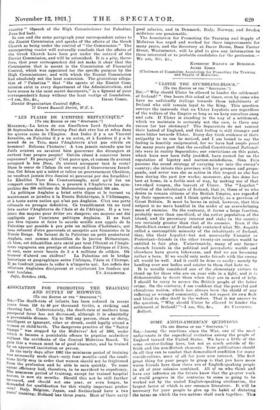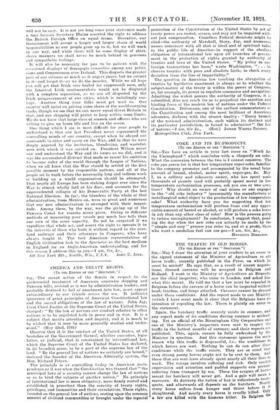SOME ANGLO-AMERICAN QUESTIONS.
[To THE EDITOR or TIIE SPECT/TOR."1 SLR,—Among the reactions since the War, one of the most unfortunate is the superficial irritation among the people of England toward the United States. We have a little of the same counter-feeling here, but not so much outside of the Irish and the non-British elements. Your publications should do all they can to combat that demoralized condition for many considerations, most of all for your own interest. The first great thing for your people to grasp is that you have more warm friends here than there are of English-speaking people in all of your colonies combined. All of us who think and have any influence on the future know that The greater work of world progress in the centuries to come is going to be worked out by the united English-speaking civilization, the largest factor of which is our common literature. It will be necessary for your people to give up its habit of dictating the terms on which the two nations shall work together. This
will not be easy. It is not yet.long since your statesmen made a roar because Secretary Blaine asserted the right to address the British Foreign Office on equal terms. Hereafter, our Government will accept a larger and larger share of world responsibilities as our people grow up to it, but we will work in our way, and while there will be some display of shirt- sleeve manners we shall never be much behind in generous and sympathetic feelings.
It will also be necessary for you to be patient with the occasional displays of demagogic cowardice among our politi- cians and Congressmen over Ireland. This disgusts the greater part of our citizens as much as it angers yours, but we submit to it—and forget it—as we do the measles. While we all hope you will get that Irish sore healed (or suppressed) soon, only the fanatical Irish sentimentalists would not be disgusted with a complete separation, as we are all disgusted by the Irish misgovernment of our cities, which is unfailingly cor- rupt. Another thing your folks must get used to. Our country will insist on getting some share of the world-carrying trade, though we see that we can never equal Great Britain in that, and our shipping will prefer to keep within some limits. We do not have that large claSs of seamen and officers who are wilting to give up home life and live on the ocean.
One thing- which I see is most difficult for your people to understand is that our last President never represented the controlling minds of our country, except when he obeyed our commands to enter and carry on the War, and in that we were deeply angered by the hesitation, blundering, and wasteful- ness with which it was carried on. President Wilson never saw and understood the War and its issues as we did, and it was the accumulated distrust that made us resent his ambition fo become ruler of the world through the League of Nations, when we all knew that the War should be settled at the first possible moment by the responsible nations, and all of the People set to work before the necessarily long and tedious work of building up a world organization should be attempted. That nearly all Europe has been sinking sleeper ever since the War is almost wholly laid at his door, and accounts for the unprecedented collapse of his Democratic Party at the last National Election. In fact, the blunders of the whole of 'that administration, from Mexico on, were so great and numerous that our new administration is swamped with -their magni- tude. Among these, by the way, was the giving up of the Panama Canal for reasons never given. Owing to different methods of measuring your vessels pay much less tolls than onr own of the same capacity. Do not be surprised if we repudiate that whole act, and assert the right to operate it in the interests of those who built it without regard to the over- land railways and their attorneys in Congress, who have always fought it. The best American representatives of English civilization look to the Spectator as the best medium in England for an Anglo-American understanding, and for this reason I address this to you.—I am, Sir, &c., 638 New York Blk., Seattle, Wis., U.S..4. Jonx E. ATER.







































 Previous page
Previous page